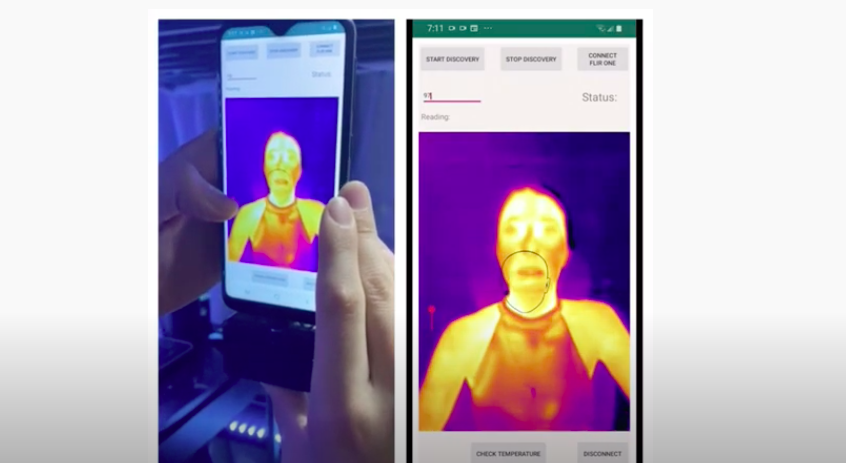Facial temperature detection, campus heatmaps: They’re among the tools in a collection of apps created by teams from within the University System of Maryland over the last month to help limit the spread of COVID-19 — and navigate a society that has changed quickly in the pandemic.
In all, six apps were selected as winners of the USM COVID App Challenge, which was issued at the end of May to galvanize the creation of new tools to respond to the pandemic.
It’s the first new initiative born directly from the USM COVID Research & Innovation Task Force, which came together in April with an eye toward advancing projects that arise from the 12 universities and three research centers in the system, and engaging the business and entrepreneurial community. With new ideas that could be harnessed in the fight against COVID-19 springing up from the minds of students, faculty and others that work in the public higher education institutions, the organizers felt the app challenge could help surface ideas, encourage collaboration and help to move them forward into use.
“This app challenge was a great way to get everyone excited and enthused about the work that is possible when we lock arms together,” said Tom Sadowski, USM vice chancellor for economic development and a member of the task force.
There may also be a direct benefit for the institutions: “As we look to the fall and inviting students back to campus, there are a couple of ideas there that students came up with that could helpful to us,” said Lindsay Ryan, USM venture development director.
The challenge was also a point of corporate collaboration for the technologists and universities, as it brought in resources and expertise from a pair of notable tech companies: Amazon Web Services offered access to a COVID-19 data lake, as well as training, mentorship and credits for the top teams, while IBM offered access to cloud accounts and starter kits for creating new apps. Sadowski sees it as a “first step in a longer journey we hope to take with them and other members of the corporate community.”
“IBM was honored to be part of the USM COVID App Challenge that helped identify new coding talent and innovative applications to help keep people safe during our pandemic times,” said John Joaquin, IBM’s managing executive for the public sector, in a statement.
Both companies also had experts that were part of the judging, along with faculty members and leaders of Maryland-based tech companies Inky and SmartLogic.
The selected winners received a cash prize of $3,000, made possible with support from the Alex. Brown Center for Entrepreneurship at UMBC.
Here’s a look at the winners:
- An-Tech, created by University of Maryland College Park undergraduate Andrew Karam, uses an “infrared external sensor to accurately pinpoint a person’s facial structure from a distance to detect their overall temperature.”
- ContactClassroom, created by Towson University lecturer Jal Irani, created an IOS application students, faculty and staff returning to campus that offers a heatmap of campus activity, risk ratings and building occupancy. Using machine learning, it can provide recommendations for how to stay safe on campus.
- COVID Buddy, created by Towson undergrad Gregory Okhuereigbe, is a mobile assistant that helps users conduct coronavirus self-assessments, track symptoms and create anxiety reduction strategies.
- Follow-up, from UMBC grad students Kirubel Tolosa, Pradeep Margasahayam Prakash and Raghav Deivachilai, tracks the health of COVID-19 patients in isolation, both through progress and follow-up by healthcare pros.
- Snuggrub, from the UMBC undergrads Emily Sullivan and Dominic Crofoot, allows users to search a local area for restaurant changes, aiming to enable safer dining.
- Team Breeze, from the University of Baltimore team of Stephanie Parey, Michael Vandi, Olubukola Akanbi and Charles Chase, is a contact tracing app that uses Bluetooth to track users’ location. It’s designed to limit the spread of COVID-19, and give location-specific info.
Before you go...
Please consider supporting Technical.ly to keep our independent journalism strong. Unlike most business-focused media outlets, we don’t have a paywall. Instead, we count on your personal and organizational support.
3 ways to support our work:- Contribute to the Journalism Fund. Charitable giving ensures our information remains free and accessible for residents to discover workforce programs and entrepreneurship pathways. This includes philanthropic grants and individual tax-deductible donations from readers like you.
- Use our Preferred Partners. Our directory of vetted providers offers high-quality recommendations for services our readers need, and each referral supports our journalism.
- Use our services. If you need entrepreneurs and tech leaders to buy your services, are seeking technologists to hire or want more professionals to know about your ecosystem, Technical.ly has the biggest and most engaged audience in the mid-Atlantic. We help companies tell their stories and answer big questions to meet and serve our community.
Join our growing Slack community
Join 5,000 tech professionals and entrepreneurs in our community Slack today!

The person charged in the UnitedHealthcare CEO shooting had a ton of tech connections

From rejection to innovation: How I built a tool to beat AI hiring algorithms at their own game

Where are the country’s most vibrant tech and startup communities?



